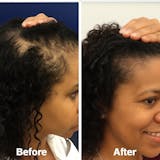Frequent Asked Questions about Hair Loss: Insights from a Pharmacist

Throughout my career as a pharmacist, I’ve had the privilege of serving my community for many years. Over time, I’ve noticed that certain health concerns consistently stand out among the multitude of questions and issues I encounter. One such concern, which seems to affect people of all ages and genders, is hair loss or hair fall. This is a deeply personal and often sensitive matter, as it extends far beyond mere aesthetics. It’s a matter of self-esteem, self-perception, and emotional well-being. In this blog, I aim to delve deeply into my experiences and insights as a pharmacist, addressing the myriad questions I frequently receive about hair loss. I intend to provide a comprehensive and holistic perspective on this common issue.
Understanding the Worry About Hair Loss:
Hair loss isn’t merely a cosmetic issue; it’s a concern that profoundly impacts the lives of those experiencing it. Patients who approach the pharmacy seeking advice on this matter often carry concerns that extend beyond the physical. They express a profound worry about their self-esteem and confidence, fearing that hair loss can diminish their self-worth. As a pharmacist, it’s essential to recognize the emotional and psychological aspects of this issue and offer a holistic approach that goes beyond merely recommending products or medications. This involves understanding the emotional toll that hair loss can take and addressing it alongside the medical aspects.

Common Questions About Hair Loss:
-
“Why am I losing my hair?”
- Hair loss isn’t a one-size-fits-all problem. It can be attributed to a wide array of factors, including genetics, hormonal changes, medical conditions, medications, and lifestyle choices. A thorough exploration of the patient’s history and potential contributing factors is necessary to offer a tailored response.
-
“Do over-the-counter treatments actually produce results?”
- Patients often inquire about over-the-counter (OTC) products that claim to address hair loss. It’s crucial to advise them on exercising caution and seeking products with clinically validated ingredients such as Minoxidil, Caffeine oil, Saw Palmetto, Biotin, and Rosemary oil. However, managing expectations is vital since OTC treatments may not work for everyone and might necessitate time for results to become evident. It’s also important to stress that natural remedies, while promising, aren’t universally effective.
- “Should I see a doctor?”
- For individuals experiencing significant hair loss, the importance of consulting a healthcare professional, such as a dermatologist or an endocrinologist, cannot be overstated. Hair loss can often be a symptom of an underlying medical condition, and early diagnosis can significantly impact the course of treatment.
-
“Can medications I’m taking cause hair loss?”
- Certain medications may list hair loss as a potential side effect. In such cases, a careful review of the patient’s medication list is essential. Advising patients to consult their healthcare provider to explore alternative options when necessary is a delicate balancing act between managing their health condition and minimizing the impact on their hair.
- “What lifestyle changes can help with hair health?”
- A discussion of the role of diet, stress management, and overall lifestyle choices in maintaining hair health is crucial. Encouraging patients to maintain a balanced diet rich in essential vitamins and minerals and to practice stress-reduction techniques can significantly impact their hair’s well-being. Here, the conversation extends to addressing broader lifestyle factors that may be contributing to hair loss.
- “What about hair supplements?”
- Dietary supplements often pique the interest of patients seeking to improve their hair health. While some supplements may offer benefits, it’s vital to stress the importance of consulting a healthcare provider before adding them to their daily routine. Ideally, a balanced diet should provide all the essential nutrients for healthy hair, and supplements should complement, not replace, a wholesome diet.
- “Is it normal to lose some hair every day?”
- The natural hair growth cycle involves shedding some hair daily, which is entirely normal. Understanding the cyclical nature of hair growth helps to alleviate concerns. However, distinguishing between normal hair loss and excessive or sudden hair loss is crucial, as the latter may indicate an issue that needs attention.
- “How can I prevent hair loss during chemotherapy or radiation therapy?”
- Cancer patients undergoing treatments like chemotherapy and radiation often harbor concerns about hair loss. In these cases, providing information about scalp cooling techniques and the potential use of scalp cooling caps, which may reduce hair loss during certain cancer therapies, becomes pivotal. Here, the discussion extends beyond general hair health to a specialized approach to mitigate the side effects of specific medical treatments.
-
“Can stress cause hair loss, and what can I do about it?”
- Stress-related hair loss, often referred to as telogen effluvium, is a common concern. This necessitates an exploration of the intricate connection between stress and hair loss. Furthermore, it requires suggesting a range of stress management techniques such as meditation, yoga, or counseling to help patients mitigate its effects. The discussion here branches into the realm of mental and emotional well-being, where stress management plays a pivotal role.
- “What are the potential side effects of prescription hair loss treatments?”
- Patients considering prescription treatments such as finasteride or minoxidil frequently inquire about potential side effects. Here, it’s crucial to provide a comprehensive understanding of common side effects and advise patients to engage in open discussions with their prescribing healthcare provider. This extends beyond the discussion of hair loss alone to a broader understanding of medical treatments and their potential impacts.
- “How long does it take to see results with hair loss treatments?”
- Patients often seek to understand the timeline for experiencing results with hair loss treatments. In response, it’s essential to explain that results can vary widely and that noticeable improvements typically become evident after consistent use over a span of 6 to 9 months. This is a nuanced conversation that deals with the importance of patience and persistence in the context of hair loss treatments.
- “Is hair transplant surgery an option for me?”
- In cases of severe hair loss, patients often explore the option of hair transplant surgery. Here, the guidance extends to recommending that they consult with a qualified hair transplant specialist. The discussion should encompass a thorough evaluation to determine whether the patient is a suitable candidate, along with an exploration of the procedure’s risks and benefits. This is a complex decision that delves into a surgical approach and requires in-depth consultation.
Conclusion:
Hair loss is a topic that consistently generates questions from patients at the pharmacy. As a pharmacist, my role extends beyond merely providing products; it involves offering guidance, support, and empathy to individuals grappling with this common concern. While I can provide information and suggestions, it’s paramount to emphasize the significance of consulting a healthcare professional for personalized advice and treatment options. By addressing hair loss in its entirety, both medically and emotionally, we can assist patients on their journey to healthier, more confident lives. This deep, comprehensive approach recognizes that hair loss is a multifaceted issue with numerous factors at play, and understanding it thoroughly is key to helping patients navigate their unique experiences.











